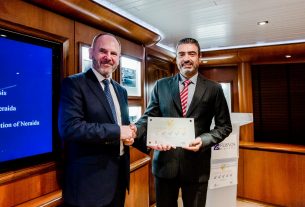Cruise Lines International Association (CLIA), represented by its European Chairman, Mr Pierfrancesco Vago, participated alongside the International Chamber of Shipping (ICS), in the G7 Transport Ministerial Session on Maritime Connectivity on 13 April 2024.
At the meeting, Mr Vago expressed the cruise industry’s solidarity with the wider maritime sector on the imperative to ensure seafarer safety, considering current security threats in the Red Sea and elsewhere. CLIA highlighted how the maritime sector is united in condemning the attacks and is calling upon the international community to adopt the adequate measures to protect seafarers at the next IMO Maritime Safety Committee on 15-24 May 2024, and to develop adequate solutions to the crisis. The cruise industry employs one-third of the world’s seafarers and believes that safety must be integral to any international response to the security situation.
Discussions also focused on what infrastructure investment will be needed to preserve global maritime connectivity in light of international climate change commitments. Adaptability of the global maritime network to reflect the new needs in decarbonised energy sources will be a key factor in maintaining global connectivity, while meeting climate objectives.
Mr Vago said, “This was an important opportunity to raise the vital issue of seafarer safety with G7 Ministers. It was also valuable to discuss the industry’s transition to a future of low and net-zero carbon fuels and what this means for future maritime connectivity. It will be vital to ensure the new types of fuels and the necessary portside infrastructure are available at scale in the locations where they are needed to avoid bottlenecks in maritime routes.”
The cruise industry is leading a step change in the technologies and fuels used in shipping to address the climate challenge. Within the next two decades, starting already today, there will be ships sailing that will use new types of fuels as the industry moves away from fossil fuels towards low and net-zero carbon fuels. The new technologies that the industry is deploying and testing onboard cruise ships will also be critical for wider application across maritime.
To help identify future needs, CLIA recently announced that it has launched a study on global investment needs to expedite the energy transition of our sector. This study will include a mapping on the infrastructure and energy needs at ports served by the cruise sector.
The cruise industry plays a critical role in maintaining and enhancing strategic maritime industrial capacity in Europe. Cruise ships represent 80% of the orderbook value for European shipyards, making our industry critical to maintaining the technical know-how of these countries in complex shipbuilding.
About the Cruise Lines International Association (CLIA)
CLIA is the world’s largest cruise industry trade association, providing a unified voice for the industry as the leading authority of the global cruise community, with a membership comprising 55 cruise lines, including 294 ocean going cruise ships, representing 95% of the cruise sector. On behalf of its members, affiliates and partners, the organization supports policies and practices that foster a secure, healthy, and sustainable cruise ship environment, promoting positive travel experiences for millions of travelers who cruise annually. This year, CLIA forecasts that annual the number of passengers will reach 35 million passengers. The CLIA community includes the world’s most prestigious ocean, river, and specialty cruise lines; a highly trained and certified travel agent community; and a widespread network of stakeholders, including ports & destinations, ship development, suppliers, and business services.




